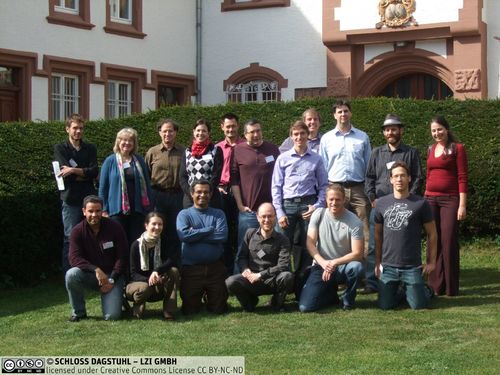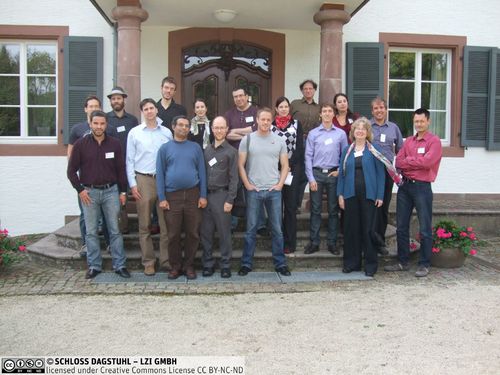Dagstuhl-Perspektiven-Workshop 12382
Computation and Palaeography: Potentials and Limits
( 18. Sep – 21. Sep, 2012 )
(zum Vergrößern in der Bildmitte klicken)
Permalink
Bitte benutzen Sie folgende Kurz-Url zum Verlinken dieser Seite:
https://www.dagstuhl.de/12382
Organisatoren
- Tal Hassner (The Open University of Israel - Raanana, IL)
- Malte Rehbein (Universität Würzburg, DE)
- Peter A. Stokes (King's College - London, GB)
- Lior Wolf (Tel Aviv University, IL)
Kontakt
- Annette Beyer (für administrative Fragen)
Publikationen
- Computation and Palaeography: Potentials and Limits (Dagstuhl Perspectives Workshop 12382). Tal Hassner, Malte Rehbein, Peter A. Stokes, and Lior Wolf. In Dagstuhl Reports, Volume 2, Issue 9, pp. 184-199, Schloss Dagstuhl - Leibniz-Zentrum für Informatik (2013)
- Computation and Palaeography: Potentials and Limits (Dagstuhl Perspectives Workshop 12382). Tal Hassner, Malte Rehbein, Peter A. Stokes, and Lior Wolf. In Dagstuhl Manifestos, Volume 2, Issue 1, pp. 14-35, Schloss Dagstuhl - Leibniz-Zentrum für Informatik (2013)
Impacts
- Dagstuhl Manifesto : Computation and Palaegraphy : Potentials and Limits : pp. 196-198 : article - Hassner, Tal; Rehbein, Malte; Stokes, Peter A.; Wolf, Lior - Berlin : Springer, 2013 - /Informatik Spektrum : 36. 2013, 2).
- Document classification based on what is there and what should be there : article in "Digital Huminaties 2013" : 5 pp - Levy, Noga; Wolf, Lior; Strokes, Peter A. - Lincoln : University of Nebraska, 2013..
- Estimating the Distinctiveness of Graphemes and Allographs in Palaeographic Classification : article in "Digital Humanities 2012" : 8 pp - Levy, Noga; Wolf, Lior; Dershowitz, Nachum; Stokes, Peter A. - Hamburg : Universität, 2012.
- OCR-Free Transcript Alignment : article in IACPR 2013 : pp. 1310-1314 - Hassner, Tal; Wolf, Lior; Dershowitz, Nachum - Los Alamitos : IEEE, 2013. - pp. 1310-1314 - (2013 12th International Conference on Document Analysis and Recognition (ICDAR)).
- Viral Transcript Alignment : article in "ICDAR 2015, International Conference on Document Analysis and Recognition" : 5 pp. - Sadeh, Gil; Wolf, Lior; Hassner, Tal; Dershowitz, Nachum; Stökl Ben-Ezra, Daniel - Los Alamitos : IEEE, 2015.
Programm
The Schloss-Dagstuhl Perspectives Workshop on `Computation and Palaeography: Potentials and Limits' focused on the interaction of palaeography, the study of ancient and medieval documents, and computerized tools developed for analysis of digital images in computer vision. During the workshop, the interaction between domain experts from palaeography and computer scientists with computer vision backgrounds has yielded several very clear themes for the future of computerized tools in palaeographic research. Namely,
- Difficulties in communication between palaeographers and computer scientists is a prevailing problem. This is often reflected not only in computerized tools failing to meet the requirements of palaeography practitioners but also in the terminology used by the two disciplines. Better communication should be fostered by joint events and long-term collaborations.
- Computerized palaeographic tools are often black boxes which put the palaeography scholar on one end of the system, only receiving a systems output, with little opportunity to directly influence how the system performs or communicates with it using natural palaeographic terminology. The long-term desire is to have the scholar at the center of the computerized system, allowing interaction and feedback in order to both fine-tune performance and better interpret and communicate results. This is crucial if palaeography is to become a truly evidence based discipline. To this end the use of high-level terminology, natural to palaeography, should be integrated into computerized palaeographic systems.
- Palaeographic data, scarce to begin with, is even more restricted by accessibility and indexing problems, non-standard benchmarking techniques and the lack of accurate meta-data and ground truth information. Multiple opportunities were identified for acquiring data and disseminating it both in the palaeographic research community and outside to the general public.
- Palaeographic research is largely restricted to the domain of experts. Making palaeography accessible to non-experts by using computerized tools has been identified as an effective means of disseminating valuable cultural heritage information while at the same time potentially giving rise to crowdsourcing opportunities, such as those proved successful in other domains.
The manifesto which resulted from this work elaborates on the existing challenges and limitations of the field and details the long-term recommendations that have emerged in the workshop.
- Dimitris Arabadjis (National Technical University of Athens, GR)
- Nachum Dershowitz (Tel Aviv University, IL) [dblp]
- Matthieu Exbrayat (University of Orleans, FR)
- Shira Faigenbaum (Tel Aviv University, IL)
- Melanie Gau (TU Wien, AT)
- Tal Hassner (The Open University of Israel - Raanana, IL) [dblp]
- R. Manmatha (University of Massachusetts - Amherst, US) [dblp]
- Ophir Münz-Manor (The Open University of Israel - Raanana, IL)
- Eyal Ofek (Microsoft Research - Redmond, US)
- Micalis Panagopoulos (Ionian University - Corfu, GR)
- Robert Sablatnig (TU Wien, AT) [dblp]
- Wendy Scase (University of Birmingham, GB)
- Timothy Stinson (North Carolina State University, US)
- Peter A. Stokes (King's College - London, GB) [dblp]
- Dominique Stutzmann (CNRS - Paris, FR) [dblp]
- Ségolène Tarte (University of Oxford, GB) [dblp]
- Lior Wolf (Tel Aviv University, IL)
Verwandte Seminare
- Dagstuhl-Seminar 14302: Digital Palaeography: New Machines and Old Texts (2014-07-20 - 2014-07-24) (Details)
Klassifikation
- computer graphics / computer vision
- data bases / information retrieval
- society / human-computer interaction
Schlagworte
- Palaeography
- Digital Palaeography
- Cultural Heritage
- Computation
- interdisciplinary studies



